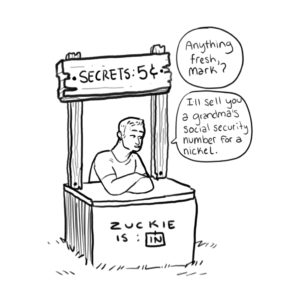The staff editorial is the majority opinion of The Murray State News Editorial Board.
 It’s no secret our personal information is not always as personal as we would like it to be. At times it seems strangers on the other side of the globe know us better than we know ourselves. The recent revelations regarding Facebook and who exactly has access to our information means our instincts were likely correct.
It’s no secret our personal information is not always as personal as we would like it to be. At times it seems strangers on the other side of the globe know us better than we know ourselves. The recent revelations regarding Facebook and who exactly has access to our information means our instincts were likely correct.
Cambridge Analytica is the organization at the heart of the scandal. The organization is known for gathering consumer information which can then be utilized by third parties. In 2015, due to lax security on Facebook’s end, Cambridge Analytica gained access to the information of over 50 million people, according to reports from Forbes.com.
We must make it clear the organization did not get sensitive data directly from Facebook, but via a third party app which Facebook granted access. This app masqueraded as a personality test, gathering information regarding a user’s likes, dislikes, habits and other potential identifiers. This was then auctioned off to any entity which could utilize it for marketing purposes.
This is the way of the internet and your security is not guaranteed. Facebook is a multi-billion dollar company, but despite all its safeguards, we slipped through the cracks.
The hashtag “Delete Facebook” is trending, but is that really the answer? No doubt most would benefit from one less social media account to manage. However, if one isn’t willing to forgo the internet entirely, it’s like fighting a losing battle.
Unfortunately, we can’t even rely on our government to act in our best interests. Net neutrality was meant to protect the free internet, but was struck down. Our elected officials have sided with big businesses more than once.
So what can we do? We’re in the age of the smart device, where everything from our speakers to our watches require an internet connection to function. Search engines log our searches, interests and that one time you were really curious about how long a giraffe’s tongue is. We are being cataloged at all times.
Not everyone is out to use this data for nefarious purposes, though. Most information gathered is utilized to make our web experience streamlined and efficient. The internet is not static and its growth relies on our input.
Privacy on the internet is a privilege, not a right. No matter how diligent Facebook or any other tech company is, someone will always find the back door.
What we can do is board that back door up as best as possible. Take precautions with how much personal information you share and with who over the internet. Pause a moment to read the “Terms of Service” very carefully. It’s typically a tedious read, but think of it as a binding contract: you always read before you sign.
All apps request “permission” to access certain parts of your tech such as contacts and messages. Some want access to the camera and microphone even when these functions aren’t utilized by said apps. Free apps are especially guilty of deceiving tactics, as they have a wider initial audience than programs which have to be bought.
Deceitful practices are nothing new. We must simply be more diligent in the digital age. Because if you don’t look after your personal information, no one else will.